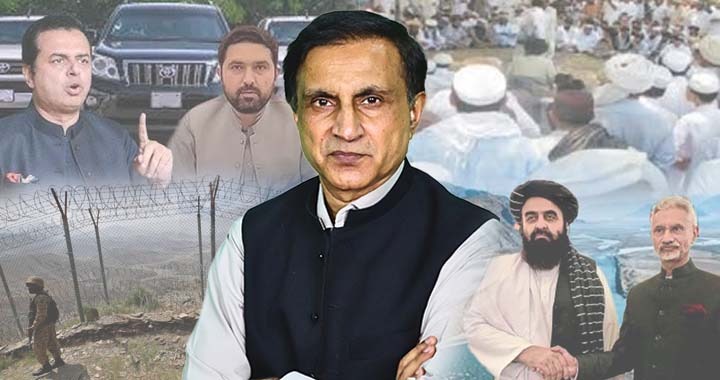The terrorist attack in Hangu once again exposes the deep cracks in Pakistan’s counterterrorism strategy and the absence of political will to back those fighting on the front lines. A police check-post was first targeted with an explosion, followed by a devastating attack on the convoy of SP Operations Asad Zubair, leading to his martyrdom along with two other officers. Their sacrifice reminds us that our security personnel continue to lay down their lives, yet the state continues to fail them.
Our officers and soldiers are paying with their blood, but the political leadership remains busy staging rallies. The tragedy in Hangu is not just another episode in a long list of terror attacks—it represents the collapse of seriousness at the political level. The most crucial element of any war, political support, is missing altogether. When the state’s defenders are denied even basic protection, how can we expect the war on terror to succeed?
The federal government, only today, handed over three bulletproof vehicles as if performing a political stunt. These imported vehicles were flaunted in ceremonies and public statements. Yet, if even one of them had been provided to SP Asad Zubair, perhaps he would have survived. It is a mockery of sacrifice and duty when politics begins to dictate security priorities.
Worse still, when the new KP government decided to return these vehicles to make a political point, it was not an act of principle—it was an act of negligence. Balochistan and Sindh quickly requested the same vehicles, recognising their necessity. The irony is painful: officers in the most vulnerable regions of KP—D.I. Khan, Tank, Lakki Marwat, Hangu, and Bannu—operate without basic protection, while their leadership plays politics with their lives.
Even SHOs and patrolling units should have bulletproof mobiles, because their lives are no less valuable. If an IED or even a small explosion occurs, a strong vehicle could save them. But instead, the KP government has shown insincerity, using political defiance where there should have been coordination. They could have negotiated for more vehicles or demanded greater federal support, but they preferred confrontation over cooperation. This attitude is costing us lives.
The loss in Hangu is not an isolated tragedy—it is a warning. If our political leaders continue to treat security as a bargaining chip, more incidents like this will follow. Our check-posts, weak and exposed, are hardly fortifications; even a small push could bring them down. The men inside stand as human shields between Pakistan and chaos.
Meanwhile, the so-called peace efforts are little more than political theatrics. Aman Jirgas are being held in Bara and other districts, but without sincerity or implementation. After the tragic Tirah incident—where 22 people, including women and children, were killed—the local lawmakers protested for restraint. The Frontier Corps held a Jirga, granting time to tribal elders to negotiate with the militants. The elders went with two demands: that the terrorists either leave the area or surrender their arms.
Yet, groups like Lashkar-e-Islam, Jamaat-ul-Ahrar, and Hafiz Gul Bahadur’s faction flatly refused. Their demands were outrageous—they wanted Sharia to be imposed across Pakistan and exclusive control of the former FATA region without interference from the state. The talks collapsed, just like every peace effort before them. Those pushing for dialogue are either deceiving themselves or are helpless before the ground realities.
It must be said clearly: the negotiators who matter are not in Khyber, Bara, or Tirah—they are in Afghanistan. The men on our soil are merely their proxies. When we speak of talks or peace, we must recognize that these are groups backed and sheltered across the border.
This brings us to the regional dimension. India, having failed in direct confrontation, is now using Afghanistan to wage proxy and hybrid wars against Pakistan. Through financial and logistical support, it backs the Balochistan Liberation Army, the Majid Brigade, and splinter TTP groups. And now, New Delhi has launched another front—hydro-terrorism—by financing dam projects in Afghanistan that threaten Pakistan’s water security.
India’s plan is strategic and sinister. It seeks to choke Pakistan’s rivers, which irrigate vital agricultural zones from Peshawar Valley to Nowshera. By funding a billion-dollar dam project in Kabul, it aims to tighten the noose around Pakistan’s food and water supply. This isn’t just environmental sabotage—it’s an act of aggression. When flood season arrives, they can release water to devastate downstream regions; when drought strikes, they can halt the flow. Either way, Pakistan suffers.
Afghanistan’s willingness to entertain such projects exposes its duplicity. The Taliban regime, which once assured Pakistan that its soil would not be used for cross-border terrorism, is now providing India a new platform. Despite Pakistan’s warnings, Afghan territory continues to be used by groups targeting our security forces.
During the Doha Agreement, Pakistan’s only two demands were clear: Afghan soil must not be used against Pakistan, and terrorists must not cross the border. Both have been violated. Now, as Islamabad and Kabul prepare for another round of talks—possibly in Istanbul—Pakistan has conveyed its position unambiguously: any attack traced back to Afghan soil will invite direct retaliation.
Pakistan has already demonstrated this capability through precision strikes in Khost, Paktika, and Paktia. The message is clear—we will no longer remain silent. The era of one-sided restraint is over. The Afghan government must understand that peace cannot coexist with duplicity. If they fail to control militants, Pakistan will act unilaterally to protect its citizens.
For the first time, Kabul knows that Pakistan will not forgive or forget. The myth that Islamabad would tolerate cross-border terrorism for the sake of diplomacy is dead. In today’s Pakistan, retaliation is a policy, not an exception.
The Hangu tragedy, therefore, is more than a local story—it reflects a national failure to align politics with security and a regional challenge that continues to test Pakistan’s patience. Unless our leaders rise above political theatrics and coordinate on a unified national strategy, Pakistan will keep bleeding—from Hangu to Tirah, and from Kabul’s schemes to India’s dams.





